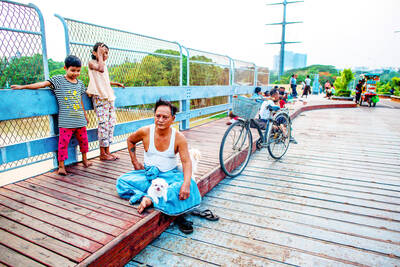As rescuers raced against time to save thousands believed missing in a massive landslide in the eastern Philippines, experts said yesterday it was an accident waiting to happen.
Government geologists have long identified as "unfit for dwelling" several areas in the province of Southern Leyte, 675km southeast of Manila, including the village of Guinsaugon, which was wiped out by the landslide on Friday.
In a geohazard assessment after a similar tragedy struck in December 2003, leaving some 300 people dead or missing, the Bureau of Mines and Geosciences warned that Southern Leyte's natural and geological features make it susceptible to landslides and floodings.
"We have advised the local government [in Southern Leyte] to immediately evacuate the people in specific areas including the area hit by the latest landslide, because it is unfit for dwelling," an official from the Department of Environment and Natural Resources told the Philippine Star newspaper.
"There should be no community existing there," the official added.
unstable soil
Most towns in Southern Leyte are surrounded by a steep mountain range as high as 800m above sea level in some areas. The steep slopes are often planted with coconut trees, whose shallow root systems do not contribute to soil stability.
Monsoon rains and typhoons also batter the province throughout the year.
"Numerous faults and major fractures cut through the major rock units," according to the geohazard assessment of the Bureau of Mines and Geosciences. "Because of these, the rocks are badly broken or fragmented. The fragmented rocks are prone to weathering and erosion."
"When continuous rainfall occurs, water seeps into the fractures of the broken rocks and promotes the deterioration of the rock mass," it added.
The bureau noted that if the amount of rainfall was limited in volume and duration, the soil and rock materials could easily absorb the water. But if the rain was excessive, the rock and soil materials would become saturated and cause landslides.
And this was exactly what happened in Guinsaugon.
After several days of torrential rains, a huge portion of Mount Can-abag collapsed and unleashed a waterfall of mud, boulders and coconut trees into the farming village of Guinsaugon, flattening houses and other structures.
Nearby villages have now been evacuated amid continuous rains that might trigger similar accidents, officials said.
According to the weather bureau, 500mm of rain fell on Southern Leyte since last week, up from an average rainfall of 127mm, loosening the soil on the mountain.
Witnesses said it was like the mountain exploded before the landslide.
Ecological excesses
Aside from the torrential rains, environmentalists also blamed rampant illegal logging, mining and other ecological excesses for such disasters.
"Our country is in a state of ecological crisis, aggravated by La Nina [a phenomenon characterized by unusually heavy rains and cold weather]," said Senator Jamby Madrigal. "We are now at the mercy of environmental disasters."
Southern Leyte Congressman Roger Mercado said illegal logging that started in the 1970s in the province had weakened the soil on the slopes of the mountain range.

As the sun sets on another scorching Yangon day, the hot and bothered descend on the Myanmar city’s parks, the coolest place to spend an evening during yet another power blackout. A wave of exceptionally hot weather has blasted Southeast Asia this week, sending the mercury to 45°C and prompting thousands of schools to suspend in-person classes. Even before the chaos and conflict unleashed by the military’s 2021 coup, Myanmar’s creaky and outdated electricity grid struggled to keep fans whirling and air conditioners humming during the hot season. Now, infrastructure attacks and dwindling offshore gas reserves mean those who cannot afford expensive diesel

Does Argentine President Javier Milei communicate with a ghost dog whose death he refuses to accept? Forced to respond to questions about his mental health, the president’s office has lashed out at “disrespectful” speculation. Twice this week, presidential spokesman Manuel Adorni was asked about Milei’s English Mastiff, Conan, said to have died seven years ago. Milei, 53, had Conan cloned, and today is believed to own four copies he refers to as “four-legged children.” Or is it five? In an interview with CNN this month, Milei referred to his five dogs, whose faces and names he had engraved on the presidential baton. Conan,

‘IN A DIFFERENT PLACE’: The envoy first visited Shanghai, where he attended a Chinese basketball playoff match, and is to meet top officials in Beijing tomorrow US Secretary of State Antony Blinken yesterday arrived in China on his second visit in a year as the US ramps up pressure on its rival over its support for Russia while also seeking to manage tensions with Beijing. The US diplomat tomorrow is to meet China’s top brass in Beijing, where he is also expected to plead for restraint as Taiwan inaugurates president-elect William Lai (賴清德), and to raise US concerns on Chinese trade practices. However, Blinken is also seeking to stabilize ties, with tensions between the world’s two largest economies easing since his previous visit in June last year. At the

French singer Kendji Girac, who was seriously injured by a gunshot this week, wanted to “fake” his suicide to scare his partner who was threatening to leave him, prosecutors said on Thursday. The 27-year-old former winner of France’s version of The Voice was found wounded after police were called to a traveler camp in Biscarrosse on France’s southwestern coast. Girac told first responders he had accidentally shot himself while tinkering with a Colt .45 automatic pistol he had bought at a junk shop, a source said. On Thursday, regional prosecutor Olivier Janson said, citing the singer, that he wanted to “fake” his suicide